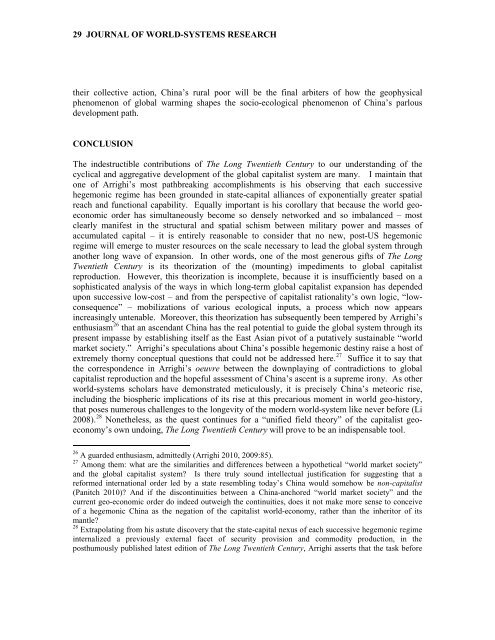Entire Volume 17 issue 1 - Journal of World-Systems Research ...
Entire Volume 17 issue 1 - Journal of World-Systems Research ...
Entire Volume 17 issue 1 - Journal of World-Systems Research ...
You also want an ePaper? Increase the reach of your titles
YUMPU automatically turns print PDFs into web optimized ePapers that Google loves.
29 JOURNAL OF WORLD-SYSTEMS RESEARCH<br />
their collective action, China’s rural poor will be the final arbiters <strong>of</strong> how the geophysical<br />
phenomenon <strong>of</strong> global warming shapes the socio-ecological phenomenon <strong>of</strong> China’s parlous<br />
development path.<br />
CONCLUSION<br />
The indestructible contributions <strong>of</strong> The Long Twentieth Century to our understanding <strong>of</strong> the<br />
cyclical and aggregative development <strong>of</strong> the global capitalist system are many. I maintain that<br />
one <strong>of</strong> Arrighi’s most pathbreaking accomplishments is his observing that each successive<br />
hegemonic regime has been grounded in state-capital alliances <strong>of</strong> exponentially greater spatial<br />
reach and functional capability. Equally important is his corollary that because the world geoeconomic<br />
order has simultaneously become so densely networked and so imbalanced – most<br />
clearly manifest in the structural and spatial schism between military power and masses <strong>of</strong><br />
accumulated capital – it is entirely reasonable to consider that no new, post-US hegemonic<br />
regime will emerge to muster resources on the scale necessary to lead the global system through<br />
another long wave <strong>of</strong> expansion. In other words, one <strong>of</strong> the most generous gifts <strong>of</strong> The Long<br />
Twentieth Century is its theorization <strong>of</strong> the (mounting) impediments to global capitalist<br />
reproduction. However, this theorization is incomplete, because it is insufficiently based on a<br />
sophisticated analysis <strong>of</strong> the ways in which long-term global capitalist expansion has depended<br />
upon successive low-cost – and from the perspective <strong>of</strong> capitalist rationality’s own logic, “lowconsequence”<br />
– mobilizations <strong>of</strong> various ecological inputs, a process which now appears<br />
increasingly untenable. Moreover, this theorization has subsequently been tempered by Arrighi’s<br />
enthusiasm 26 that an ascendant China has the real potential to guide the global system through its<br />
present impasse by establishing itself as the East Asian pivot <strong>of</strong> a putatively sustainable “world<br />
market society.” Arrighi’s speculations about China’s possible hegemonic destiny raise a host <strong>of</strong><br />
extremely thorny conceptual questions that could not be addressed here. 27 Suffice it to say that<br />
the correspondence in Arrighi’s oeuvre between the downplaying <strong>of</strong> contradictions to global<br />
capitalist reproduction and the hopeful assessment <strong>of</strong> China’s ascent is a supreme irony. As other<br />
world-systems scholars have demonstrated meticulously, it is precisely China’s meteoric rise,<br />
including the biospheric implications <strong>of</strong> its rise at this precarious moment in world geo-history,<br />
that poses numerous challenges to the longevity <strong>of</strong> the modern world-system like never before (Li<br />
2008). 28<br />
Nonetheless, as the quest continues for a “unified field theory” <strong>of</strong> the capitalist geoeconomy’s<br />
own undoing, The Long Twentieth Century will prove to be an indispensable tool.<br />
26<br />
A guarded enthusiasm, admittedly (Arrighi 2010, 2009:85).<br />
27<br />
Among them: what are the similarities and differences between a hypothetical “world market society”<br />
and the global capitalist system? Is there truly sound intellectual justification for suggesting that a<br />
reformed international order led by a state resembling today’s China would somehow be non-capitalist<br />
(Panitch 2010)? And if the discontinuities between a China-anchored “world market society” and the<br />
current geo-economic order do indeed outweigh the continuities, does it not make more sense to conceive<br />
<strong>of</strong> a hegemonic China as the negation <strong>of</strong> the capitalist world-economy, rather than the inheritor <strong>of</strong> its<br />
mantle?<br />
28<br />
Extrapolating from his astute discovery that the state-capital nexus <strong>of</strong> each successive hegemonic regime<br />
internalized a previously external facet <strong>of</strong> security provision and commodity production, in the<br />
posthumously published latest edition <strong>of</strong> The Long Twentieth Century, Arrighi asserts that the task before





